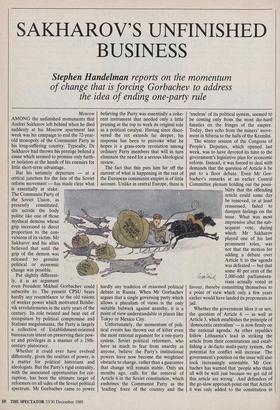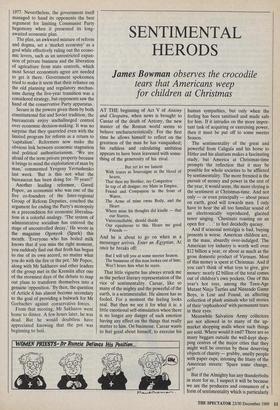SAKHAROV'S UNFINISHED BUSINESS
Stephen Handelman reports on the momentum
of change that is forcing Gorbachev to address the idea of ending one-party rule
Moscow AMONG the unfinished monuments that Andrei Sakharov left behind when he died suddenly at his Moscow apartment last week was his campaign to end the 72-year- old monopoly of the Communist Party in his long-suffering country. Typically, Dr Sakharov had thrown his prestige behind a cause which seemed to promise only furth- er isolation at the hands of his enemies for little short-term advantage.
But his untimely departure — at a critical juncture for the fate of the Soviet reform movement — has made clear what is essentially at stake. The Communist Party of the Soviet Union, as presently constituted, sits astride the body politic like one of those mythical demons whose grip increased in direct proportion to the con- vulsions of its victim. Mr Sakharov and his allies believed that until the grip of the demon was released no genuine political or economic change was possible.
Put slightly different- ly, it is an argument even President Mikhail Gorbachev could subscribe to. The present CPSU bears hardly any resemblance to the old visions of worker power which motivated Bolshe- vik revolutionaries in the early years of the century. Its role twisted and bent out of recognition by political compromise and Stalinist megalomania, the Party is largely a collection of Establishment-oriented bureaucrats intent on preserving their pow- er and privileges in a manner of a 19th- century plutocracy.
Whether it could ever have evolved differently, given the realities of power, is a matter for political historians and ideologists. But the Party's rigid centrality, with the associated opportunities for cor- ruption, has been the ultimate target of reformers on all sides of the Soviet political spectrum. Mr Gorbachev came to power believing the Party was essentially a cohe- rent instrument that needed only a little pruning at the top to work its original role as a political catalyst. Having since disco- vered the rot extends far deeper, his response has been to provoke what he hopes is a grass-roots revolution among ordinary Party members that will in turn eliminate the need for a serious ideological review.
The fact that this puts him far off the current of what is happening in the rest of the European communist empire is of little account. Unlike in central Europe, there is hardly any tradition of reasoned political debate in Russia. When Mr Gorbachev argues that a single governing party which allows a pluralism of views is the only suitable bulwark against anarchy, it is a point of view understandable in places like Tokyo or Mexico City.
Unfortunately, the momentum of poli- tical events has thrown out of kilter even the most rational argument for a one-party system. Soviet political reformers, who have as much to fear from anarchy as anyone, believe the Party's institutional powers have now become the weightiest obstacle to change, rather than a guarantee that change will remain stable. Only six months ago, calls for the removal of Article 6 in the Soviet constitution, which enshrines the Communist Party as the `leading' force of the country and the `nucleus' of its political system, seemed to be coming only from the most die-hard fanatics on the fringes of the empire. Today, they echo from the miners' move- ment in Siberia to the halls of the Kremlin.
Whether the government likes it or not, the question of Article 6 — as well as Article 3, which establishes the principle of `democratic centralism' — is now firmly on the national agenda. As other republics follow Lithuania's lead in striking the article from their constitutions and estab- lishing a de-facto multi-party system, the potential for conflict will increase. The government's position on the issue will also look increasingly untenable. Mr Gor- bachev has warned that 'people who think all will be well just because we get rid of this article are wrong'. And defenders of the go-slow approach point out that Article 6 was only added to the constitution in 1977. Nevertheless, the government itself managed to hand its opponents the best argument for limiting Communist Party hegemony when it presented its long- awaited economic plan.
The plan, an awkward mixture of reform and dogma, set a 'market economy' as a goal while effectively ruling out the econo- mic levers, such as an unrestricted expan- sion of private business and the liberation of agriculture from state controls, which most Soviet economists agree are needed to get it there. Government spokesmen tried to make it seem that their reliance on the old planning and regulatory mechan- isms during the five-year transition was a considered strategy, but opponents saw the hand of the conservative Party apparatus.
Secure in the powers given them by both constitutional fiat and Soviet tradition, the bureaucrats enjoy unchallneged control over economic decision-making. It was no surprise that they quarreled even with the limited program for reform as a return to `capitalism'. Reformers now make the obvious link between economic stagnation and political authoritarianism. 'We are afraid of the term private property because it brings to mind the exploitation of man by man,' commented Yevgeny Yevtushenko last week. 'But is this not what the bureaucrat has been doing for 70 years?'
Another leading reformer, Gavril Popov, an economist who was one of the five co-founders of the Inter-regional Group of Reform Deputies, couched the argument for ending the Party's monopoly as a precondition for economic liberalisa- tion in a colorful analogy. 'The system of administrative socialism has entered the stage of uncontrolled decay,' He wrote in the magazine Ogonyok (Spark) this month: 'Everyone who has boiled milk knows that if you miss the right moment, you suddenly find out that froth has begun to rise of its own accord, no matter what you do with the fire or the pot.' Mr Popov, along with Mr Sakharov and other leaders of the group met in the Kremlin after one of the stormiest days of the debate to map out plans to transform themselves into a genuine 'opposition.' By then, the question of Article 6 has almost become secondary to the goal of providing a bulwark for Mr Gorbachev against conservative forces.
From that meeting, Mr Sakharov went home to dinner. A few hours later, he was dead. But he would doubtless have appreciated knowing that the pot was beginning to boil.











































































































 Previous page
Previous page